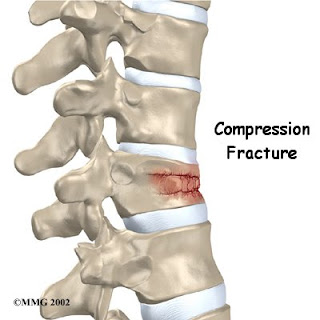
I've found that a lot of people think paralysis occurs when they hear someone "broke their back." From my experience, though, most of the spine fractures I see do not result in paralysis. Of course, a severe fracture absolutely can result in paralysis, but I find the majority of spine fracture are not that severe.

There are different types of fractures, which can involve different levels and different parts of the vertebra. Seemingly the most benign is a transverse process fracture (bony projections off the back of the vertebra, which are essentially non-weight-bearing elements). Most problems occur when the vertebral body is involved. But even with compression fractures of the vertebral body, surgery doesn't often seem required and usually treatment is a brace. Surgery would likely occur in cases involving neuro deficits, parasthesias, and/or bony fragments impinging on the spinal canal. In my previous job, in Interventional Radiology, we did a lot of vertebroplasties and kyphoplasties for compression fractures. In my current position, the Spine team almost always opts for a brace. I think I've only had 1 patient get a verteroplasty here. That is, of course, if surgical decompression isn't needed. So treatment may vary according to facility. Depending on the severity of the injury, you may get a brace, you may get a vertebroplasty/kyphoplasty, or even surgical decompression. But it may help to know if you "break" your back, it does not mean guaranteed paralysis.




No comments:
Post a Comment